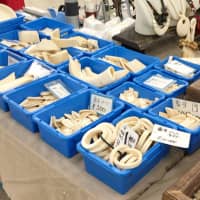Japan will tighten controls on its internationally maligned ivory market in July, requiring dealers to prove via carbon dating that specimens were legally obtained, the Environment Ministry said Friday.
"By shutting down the movement of ivory of unknown origin, the domestic market is moving closer to an effective closure," Environment Minister Yoshiaki Harada said at a news conference.
In 1990, international ivory trading was banned in principle under the Washington Convention, officially known as the Convention on International Trade in Endangered Species of Wild Fauna and Flora.
However, ivory that remains in its original form and that was obtained prior to the convention taking effect is permitted to be traded in Japan after it is registered with the Japan Wildlife Research Center.
Individuals who wish to trade ivory in the country will now have to report how it was acquired, while providing third-party testimony on its provenance.
Carbon dating to show the age of ivory will become an absolute prerequisite from July 1, making ivory obtained from recent poaching impossible to register and sell, the ministry said.
While the United States, China and other countries have taken steps to close markets, Japan has previously argued its domestic trading has no impact on poaching.
The nation's conservation law was amended in 2017 to mandate that ivory dealers register with the government, but the WWF said the measure did not resolve pressing issues involving ivory.
The conservation group said more than 2.4 tons of ivory was unlawfully exported from Japan to China and elsewhere between 2011 and 2016.



